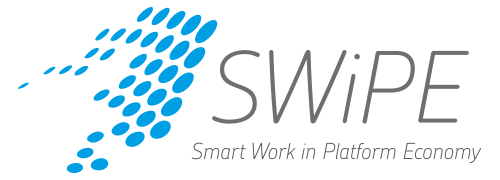Things didn’t quite go to plan recently as I was opening a seminar; I began by asking “who here is an employee – would you raise your hands? Then, I asked who here imagines themselves to be developers or managers?” What I got in return to this was a befuddled silence… a moment later a few hands inched their way up and one person added: “I imagine…”

Although I ended up apologising for my loose tongue at that event, it seems to me that my slip says something about leadership and the difficulty in defining what is a manager in today’s challenging and digitalising working life. Hence this text, and; what on earth is leadership in a platform economy?
Middle management has been cut back in many organisations; in part for reasons of cost, but also as reporting has become more and more automated. If productivity can be followed just as well from the top through IT systems, then what would one need a manager for? That each employee, contractor or entrepreneur manages themselves was underlined by panellists at the latest WorkUp event. This when the theme is crowdsourced work. It’s typical that in this context that the “boss” is referred to only as the person who wants to have those bothersome personal development conversations. And so, the conclusion is: Of course self-management always beats boring personal development conversations!
Computer systems have in recent years replaced the work of line managers. When shifts, leave coordination, incentives and productivity monitoring have all been automated, nothing is left for the manager to do other than deal with problems and aberrations, HR planning, motivating employees and gaining a deep understanding of everyday work. These last (sadly) are rare in official job descriptions; perhaps because many organisations have managed a transition to larger units and no longer needed line managers.
I’ll bet that leadership will need to be rediscovered in the platform economy. If the ideal employee of the future is at different stages of their career shifting felxibl between gig-work, entrepreneurship and “traditional” employment then how would one imagine the ideal manager? Is the manager then in every employee’s mind? An inner voice encouraging and cajoling to move forward; one that can be imagined to fit the occasion. In this picture “external” managers aren’t really needed.
I would like to imagine another path for leadership. When platform mediated gig-work becomes more common as a form of work and contracting it will likely have surprising impacts for the person – the worker. The gig-worker will have to compete both on the price of their work and on the basis of their skills. If only the most skilled succeed, workers will need to specialise and narrow down their areas of expertise – and that contains its own dangers. Also, working alone on through platforms may be fatal for career development.
If we want to create innovations, change, we will need to be able to combine different skills and the effort of many. I predict that cooperation, in its many forms, will once again be valued highly. Creative collaborative working spaces, that mix traditional employees, entrepreneurs and the self-employed are one solution to accelerating cooperation. Another solution, in my opinion, is a leader that encourages and accelerates interaction. This kind of leader open-mindedly builds relationships across organisational boundaries, creates opportunities to meet and encourages different forms of interaction. A leader that both values and uses the differences of their employees and has the strength to create places for cooperation – also face to face – represents new leadership which is becoming more visible. I myself would like to imagine a manager and leader such as this for myself.
About the Author: Eveliina Saari is a Senior Researcher at the Finnish Institute of Occupational Health (FIOH). Eveliina is also programme director for the Strategic Research Council programmes Skilled Workers – Successful Labour Markets and Health, Wellbeing and Lifestyles.
